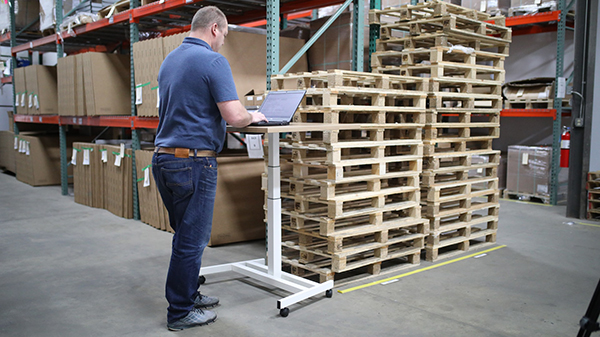Layered Process Audits (LPAs) are key to the continued recovery of US manufacturing after Covid 19 by improving processes and quality.
As US manufacturing continues its recovery from the pandemic’s impact – one key measure of manufacturing activity soared to its highest level in more than 37 years in March – factories need to continue boosting their efficiency and productivity. If manufacturers are to seize the opportunity before them as they emerge from a pandemic-hit world, and realize a predicted manufacturing boom, then it is vital production processes keep pace with consumer demand.
However, ramping up production cannot come at the expense of quality. Maintaining consistent quality levels, using Layered Process Audits (LPAs), enables manufacturers to avoid producing defective products that need to be replaced. In doing so, brands can avoid negative impacts to their reputations and the potential loss of customers. It is important the industry doesn’t trip itself up in its pursuit of bouncing back from the pandemic by slowing its output and inadvertently lowering its quality output levels.

To meet quality targets and increase efficiency with fewer resources, factories must embrace digital transformation.
One effective measure is the wider introduction of LPAs. Used by the automotive industry for many years and now finding their way into other manufacturing sectors, LPAs are a vital tool for increasing productivity and ensuring quality is maintained consistently.
An LPA is a quality technique that focuses on observing and validating how products are made rather than inspecting finished products. LPAs are not confined to the Quality Department. Rather, they involve all employees in the auditing process.
LPAs help manufacturers and service providers take control of processes, reduce mistakes, and improve both work quality and the bottom line. But are they being utilized effectively by businesses? Is there enough awareness around exactly how LPAs can benefit manufacturers by helping them standardize processes?
I would argue there isn’t today. But to aid recovery and increase efficiency, there needs to be.
Organizations with robust LPA programs in place see significantly lower rework and scrap, fewer warranty holdbacks, and reduced customer complaints.
By conducting multiple layers of the same audit, an LPA system helps ensure the audits are conducted accurately, because the auditors are essentially double-checking each other. And by including multiple layers of management, the company demonstrates that quality is important to everyone.
One of the fundamental, make or break components of an effective LPA is the questions that auditors ask. A good LPA should have between 10 and 15 yes or no questions focused on processes critical to quality, performance, or customer satisfaction.
Many companies, particularly those using old paper-based checklists, rely on overly generic questions that yield limited insights. They do this so they can use the same checklist for multiple work areas, when a best practices approach is to create separate checklists for each area. But even a well-written LPA is nothing if it’s not embraced by the workplace.
It’s critical with any manufacturing process, but especially with LPAs, that you foster a culture where good quality is rewarded and championed, rather than bad quality punished.
By digitalizing LPAs with layered process audit software and making them a key part of a factory’s digital transformation, data can be delivered to plant floor decision-makers in real-time, LPAs can become quicker and cheaper to carry out, and risk identified earlier. Digital LPAs can also help give management greater visibility and ultimately engage employees. It is crucial the manufacturing sector strives for zero defects – which starts with product design and then ensuring products are made correctly the first time, every time. This will save the industry countless hours and massive amounts of money in reproducing defective products. LPAs are an extremely effective tool in driving towards zero defects.
In a recent Ease webinar, we asked the audience to vote on the biggest barriers they are facing to effective LPAs in their organizations. Interestingly, the findings show us aside from poor questions and tracking capabilities at the setup and implementation phase, the biggest roadblocks are around culture and lack of support from senior management. To me, these aren’t issues with LPAs themselves, but systemic issues faced across the manufacturing industry surrounding all processes and performance.
Digital transformation, driven by LPAs, has the power to support a swifter and stronger recovery for our manufacturing industry. But it starts with people. If we can create collaborative, positive factory environments, where people of all levels strive for quality, underpinned by strong process and technology, the US manufacturing industry can shake off the COVID shackles once and for all, fire up its engines and emerge better and stronger

About the Author
As Chief Executive Officer, Eric Stoop leads the development and execution of Ease’s vision and long-term strategy, ensuring company growth through the delivery of innovative products and solutions.
With more than 20 years of management, strategy, and technology experience, Eric specializes in building and growing successful organizations. He is the founder and former leader of a top-ranked financial services technology firm and has aided in the turnaround of Fortune 500 companies in several high-demand industries. He has a track record of repeated success in developing partnerships and new product strategies to help clients perform complex tasks with fewer mistakes and measurable results.
Scott Ellyson, CEO of East West Manufacturing, brings decades of global manufacturing and supply chain leadership to the conversation. In this episode, he shares practical insights on scaling operations, navigating complexity, and building resilient manufacturing networks in an increasingly connected world.